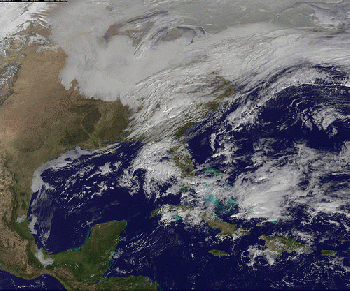
Satellite Eyes New England Winter Storm Breaking Records
(Image by NASA Goddard Photo and Video) Details DMCA
Society has changed
Every day, I learn about new changes that decrease consumers' choices around technology, increase energy consumption (by deploying new layers of infrastructure and marketing new devices), and increase EMR exposure:
* Last May, without warning, Verizon began eliminating landline phones in Brooklyn Heights, New York.
http://www.brooklyneagle.com/articles/2018/9/11/verizon-hangs-landline-customers-brooklyn
* On September 26, the FCC passed a Wireless Infrastructure Order that preempts local control over public right-of-ways. Telecom corporations are now allowed to install "small cell sites" (largely in support of 5G and the Internet of Things) on utility poles; municipalities are not allowed to deny permit applications or enact moratoria on these deployments for any reason. Please note: another FCC could rescind this Order. However, passage of the proposed STREAMLINE Act (SB 3157), currently up for a vote in Congress, would be very difficult to rescind. Let your senators know that you want them to vote NO on the STREAMLINE Act.
The U.S. Conference of Mayors strongly opposes SB3157. Twenty cities have filed a suit against the FCC's September 26, 2018 order, which, like SB3157, dictates how local governments manage their own right-of-ways.
For more information about SB 3157, visit www.whatis5g.info.
* Verizon launched 5G home broadband service on October 1 in parts of Sacramento, Los Angeles, Houston and Indianapolis.
https://www.zdnet.com/article/verizon-launching-5g-in-october/
* On November 15, the FCC voted to allow SpaceX to deploy 7,518 broadband satellites in addition to the 4,425 satellites that were approved in March 2018. The newly approved satellites will use frequencies between 37.5 and 42 GHz for space-to-earth transmissions and frequencies between 47.2 and 51.4 GHz for earth-to-space transmissions. FCC Chair Ajit Pai said these satellites will provide "high-speed broadband services in remote areas (and) global connectivity to the Internet of Things through 'routers in space' for data backhaul." The FCC has no word about these satellites' energy consumption or greenhouse-gas emissions (including just to launch them) nor their EMR emissions' impacts on public health or wildlife. https://arstechnica.com/information-technology/2018/11/spacex-gets-fcc-approval-for-7500-more-broadband-satellites/
https://www.fcc.gov/document/fcc-boosts-satellite-broadband-connectivity-competition
What is constructive use of our attention during such times?
When SteinerBooks publishes Our Web of Inconvenient Truths at the end of January, I will launch a campaign for every household to reduce consumption by 3% per month. Reducing energy consumption can also reduce exposure to electromagnetic radiation. Two easy first steps are keeping Wi-Fi off when it's not in use, and drying clothes on a rack. I'll post more ideas in my newsletters and the book.
I also vote for aligning with existing public sentiment. The media have recently given attention to Silicon Valley parents who do not want their children near any kind of screen. https://www.nytimes.com/2018/10/26/style/silicon-valley-nannies.html The UN's Intergovernmental Panel on Climate Change warned in October that we need to reduce greenhouse-gas emissions drastically--or within twelve years, or temperatures will increase to a point that living may become intolerable. Reducing screen-time exposure = reducing energy consumption = reducing greenhouse gas emissions = reducing EMR exposure = helping the whole planet.
(Note: You can view every article as one long page if you sign up as an Advocate Member, or higher).





